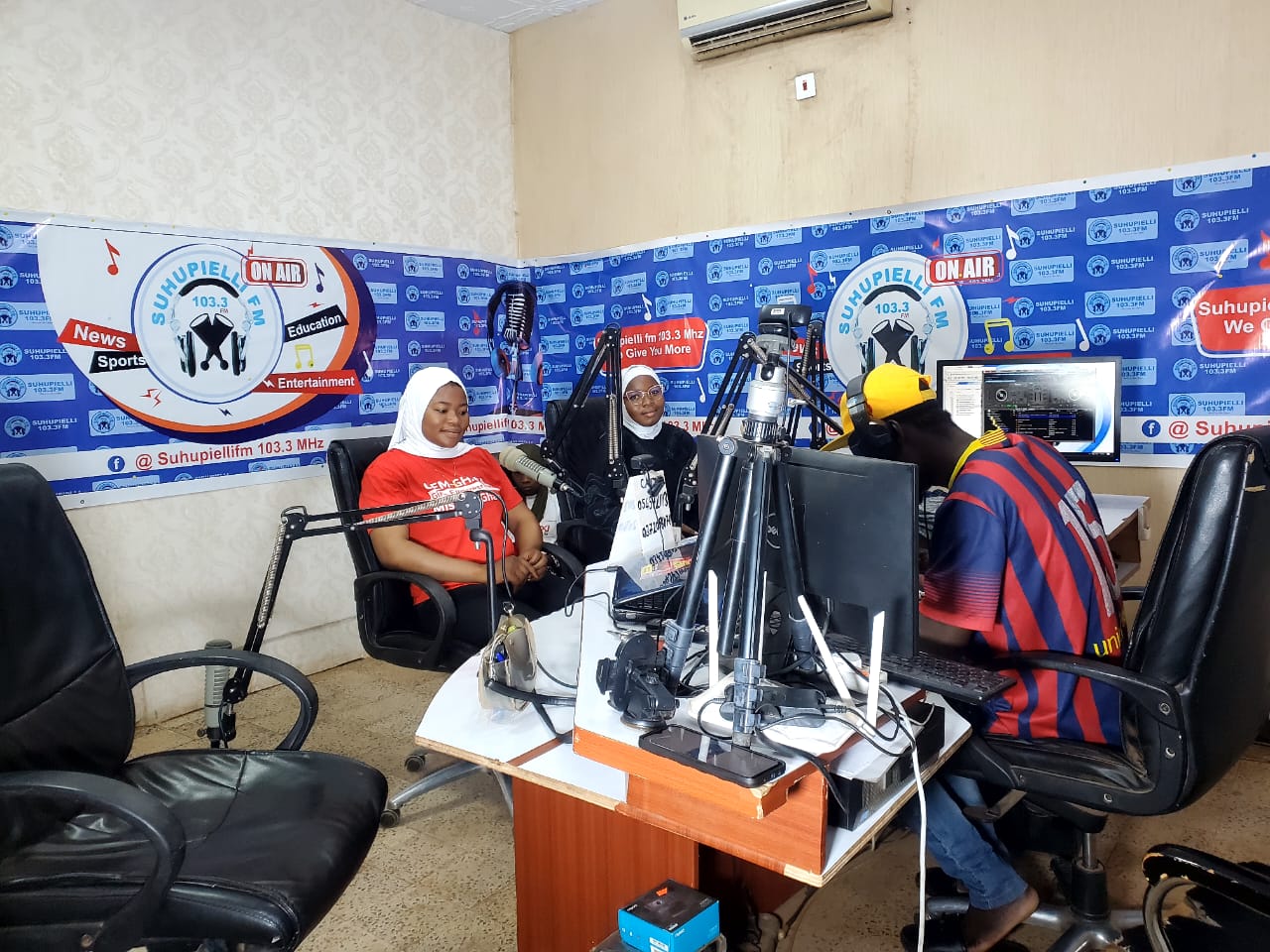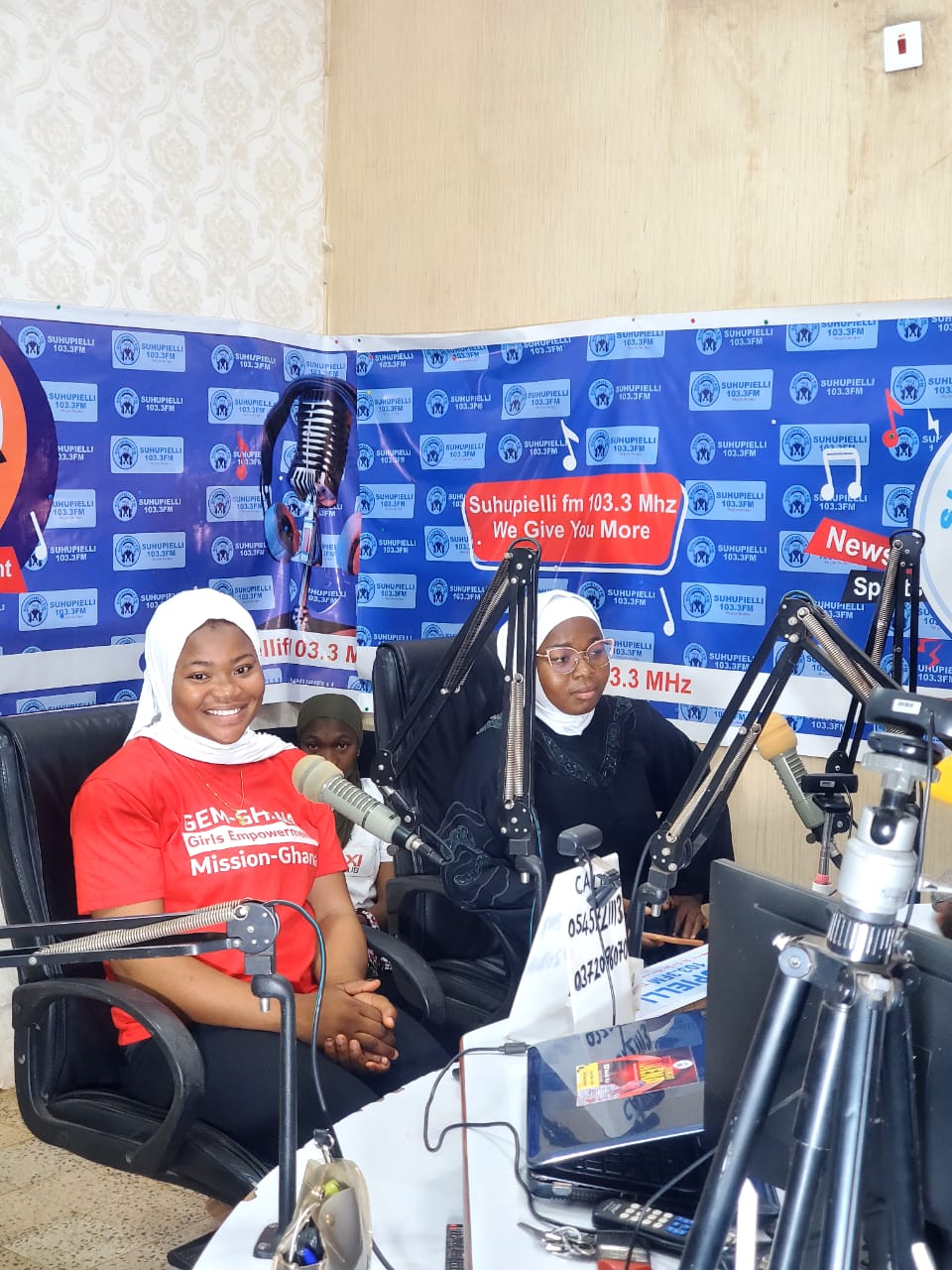Effects of The High Cost of Sanitary Products Amongst Adolescent Girls in Ghana and way forward.

On Thursday, 27th July 2023, GEM Ghana was invited to a radio discussion on Suhupelli FM 103.5 on the topic ''Effects of The High Cost of Sanitary Products Amongst Adolescent Girls in Ghana"

Miss Fatahiya Musah - WASH Coordinator, GEM Ghana, and Miss Humaida Tebantaa, a Volunteer for GEM Ghana represented the organization.
GEM Ghana believes that the high cost of sanitary products can have significant and detrimental effects on adolescent girls in Ghana. Menstrual hygiene management is crucial for their health, education, and overall well-being, and when access to affordable menstrual products is limited, the following negative consequences may arise for adolescent girls:
- Health Risks: Inadequate access to sanitary products may force girls to resort to using unhygienic alternatives, such as cloth or tissue, which can lead to increased risks of infections, rashes, and other menstrual-related health issues.
- Missed School Days: Without proper menstrual products, girls may feel uncomfortable attending school during their periods, leading to frequent absenteeism. Missing school days can disrupt their education and put them at a disadvantage compared to their male counterparts, affecting their academic performance and long-term opportunities.
- Dropout Rates: The high cost of sanitary products, coupled with societal stigma and lack of facilities like private toilets and disposal options at schools, may push some girls to drop out of school altogether, especially if they continuously face challenges in managing their menstruation.
- Impact on Mental Health: Girls may feel embarrassed or ashamed due to their inability to manage menstruation properly, leading to feelings of isolation and low self-esteem. The mental health of adolescents can suffer significantly when they face such challenges.
- Limited Participation in Daily Activities: The lack of affordable sanitary products might restrict girls' participation in daily activities, including sports, social events, and household responsibilities.
- Economic Burden on Families: For families facing financial constraints, purchasing sanitary products for their daughters can become a financial burden. This may lead to parents prioritizing other essentials over menstrual products, further exacerbating the girls' challenges.
- Cycle Disruption: Inconsistent access to menstrual products may lead to girls using the same product for an extended period, which can disrupt their menstrual cycle and lead to health issues.
- Gender Inequality: When girls are unable to attend school regularly or participate in daily activities due to menstruation, it perpetuates gender inequality and hinders efforts to achieve gender parity in education and other spheres of life.
GEM Ghana is of the view that addressing the issue of high-cost sanitary products for adolescent girls in Ghana requires a comprehensive approach that involves various stakeholders, including the government, NGOs, and the private sector.
GEM Ghana's proposed potential solutions to address the effects of the high cost of Sanitary Products include:
1 Subsidizing Sanitary Products: The government can consider subsidizing sanitary products to make them more affordable and accessible to girls and their families.
2 Promoting Menstrual Health Education: Implementing menstrual health education programs in schools can help break the stigma surrounding menstruation and raise awareness about proper menstrual hygiene management.
3 Provision of Free Menstrual Products in Schools: Schools can consider providing free menstrual products in washrooms to ensure that girls have easy access to them during school hours.
4 Supporting Local Production: Encouraging local production of affordable menstrual products can reduce costs and create job opportunities within the country.
5 Community Engagement: Involving local communities and religious leaders in conversations about menstrual health can help overcome cultural barriers and promote acceptance and support for girls' menstrual needs.
6 Reusable Menstrual Products: Promoting the use of reusable menstrual products, such as menstrual cups or cloth pads, can be a cost-effective and environmentally friendly alternative.
.jpeg)
Overall, addressing the high cost of sanitary products for adolescent girls in Ghana is crucial for ensuring their health, education, and empowerment, and it requires a concerted effort from all sectors of society.
Please support GEM Ghana with donations of cash, menstrual products, and sharing of feasible ideas to help us in our advocacy on Menstrual Hygiene Management and the Effects of the High Cost of Sanitary Products in Ghana.
Thank you in advance for your support!
Executive Secretary,
GEM Ghana
Thank you for sharing! !LADY
View or trade
LOHtokens.@elizabethbit, you successfully shared 0.1000 LOH with @gemghana and you earned 0.1000 LOH as tips. (3/22 calls)
Use !LADY command to share LOH! More details available in this post.
Thank you
You are very welcome!
Congratulations @gemghana! You have completed the following achievement on the Hive blockchain And have been rewarded with New badge(s)
Your next target is to reach 300 upvotes.
You can view your badges on your board and compare yourself to others in the Ranking
If you no longer want to receive notifications, reply to this comment with the word
STOPCheck out our last posts:
I'm proud of TEAM GEM Ghana; keep the good works up!